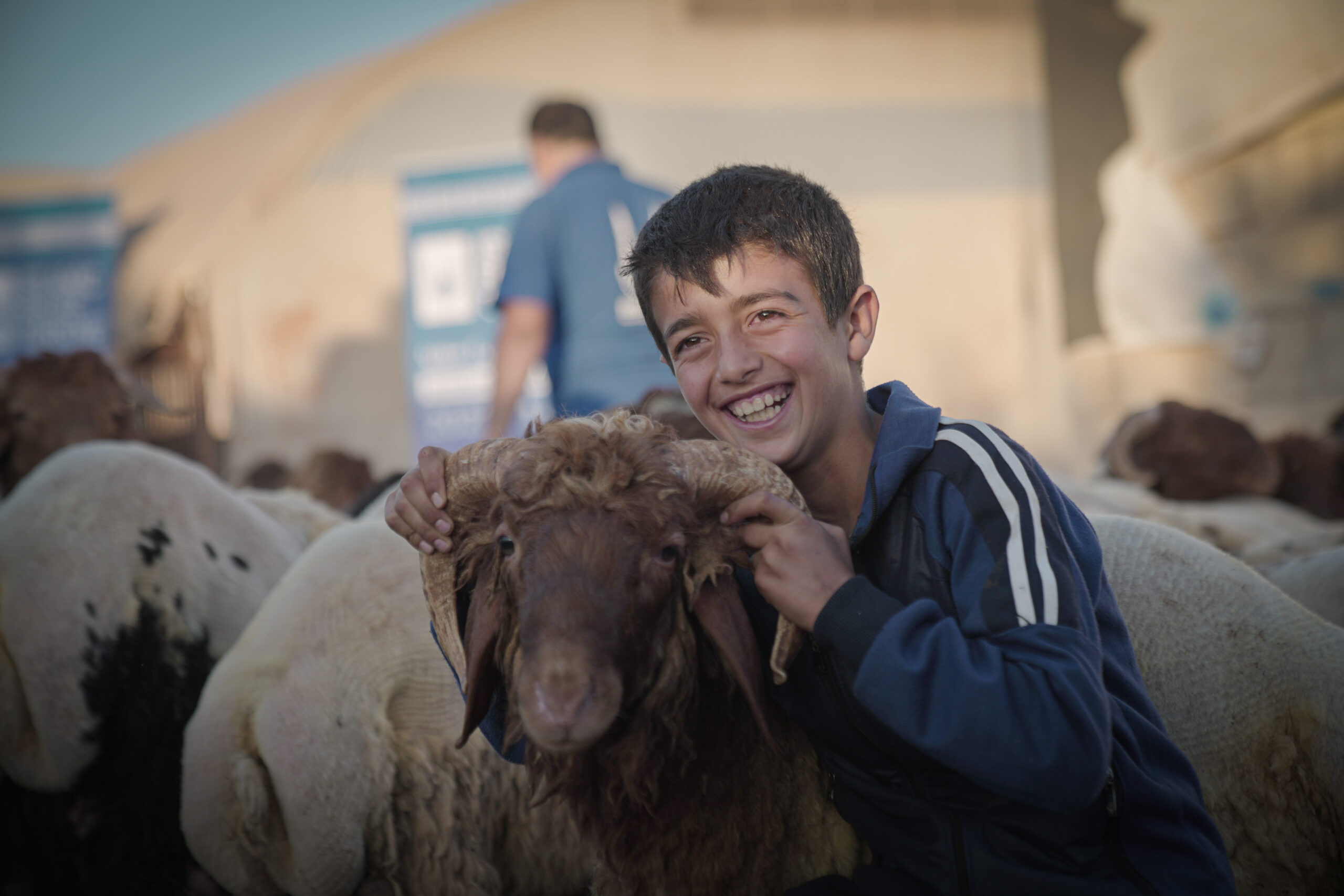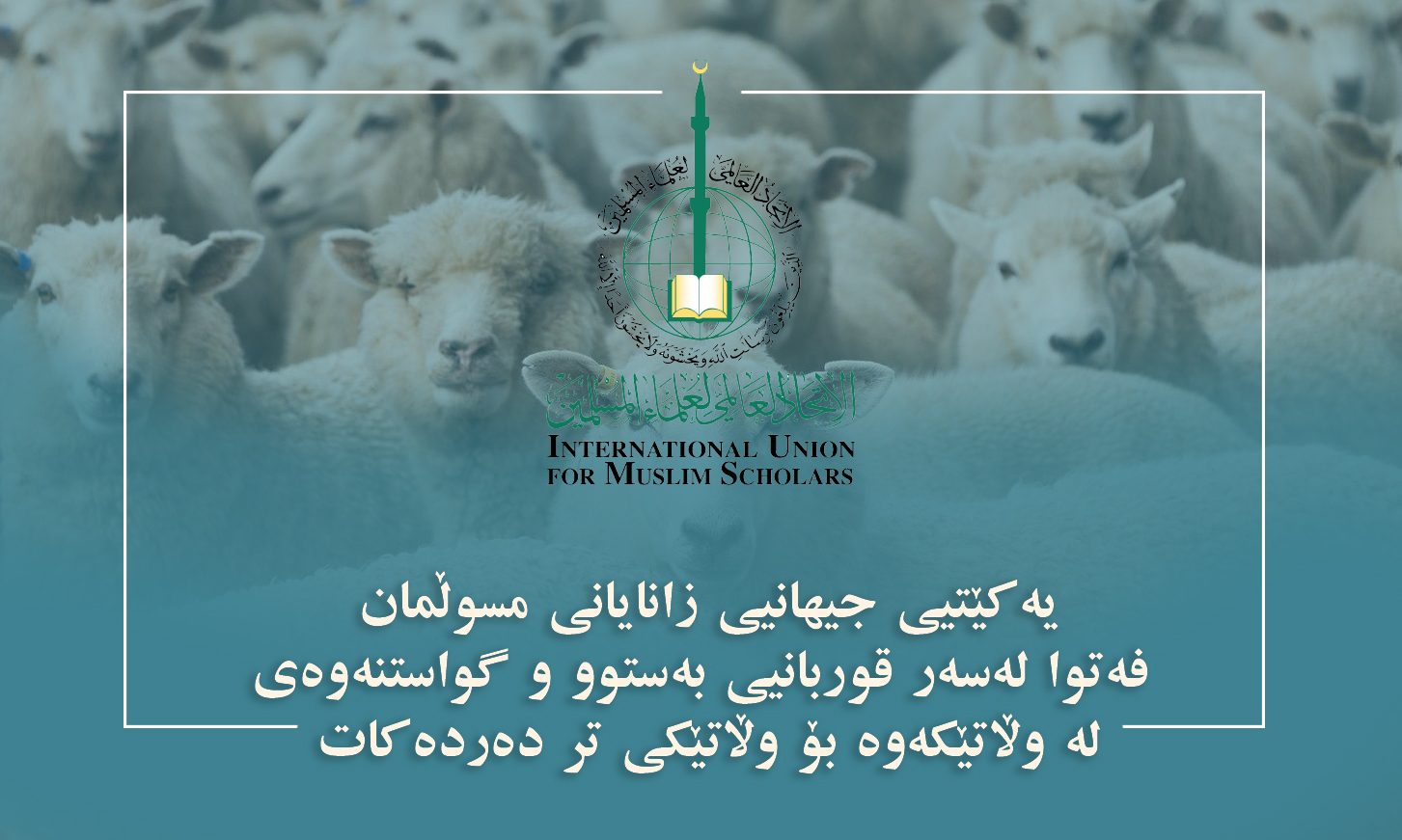Aug 07 2025

In the name of Allah, the Most Gracious, the Most Merciful
Fatwa on: Several Issues and Matters Related to Performing Qurban.
Issue One: The definition of the Sharia Qurban (sacrifice) and the sacrificial animal.
Issue Two: The Sharia ruling on performing Qurban.
Issue Three: The time for slaughtering the Qurban.
Issue Four: The one offering the sacrifice appointing someone else as their agent.
Issue Five: The legitimacy of giving Qurban to charitable organizations.
Issue Six: One head of Qurban for all members of one family.
Issue Seven: The objectives of the Sharia in performing Qurban.
Issue Eight: How to distribute the Qurban.
Issue Nine: Giving a portion of the Qurban to non-Muslims.
Issue Ten: The loss of the sacrificial animal after its purchase or designation.
Issue Eleven: Performing Qurban on behalf of others.
Issue Twelve: The animals that are suitable for sacrifice and their age.
Issue Thirteen: The Sunnah and etiquettes of performing Qurban.
Issue Fourteen: What is related to the prohibition for the one offering the sacrifice from cutting hair and trimming nails.
Issue Fifteen: The issue of transferring the Qurban and charitable organizations acting as agents in it.
Issue Sixteen: Performing Qurban with an Australian lamb, or one with a docked tail.
Issue Seventeen: The passing of the time for Qurban.
Issue Eighteen: Giving the price of the Qurban in cash to the poor instead of slaughtering it, due to their greater need for cash than meat.
Issue Nineteen: Specifying the Qurban for one family.
Issue Twenty: Handing over the Qurban (alive) to poor families for them to slaughter themselves.
Issue Twenty-One: Giving the price of the Qurban in cash to a trustworthy charitable organization.
Read the details of these issues and fatwas below:
Praise and thanks be to the Lord of the worlds, and peace and blessings be upon the Prophet sent as a mercy to the worlds and our leader Muhammad, and upon his family and companions. To proceed:
Issue One: The definition of the Sharia Qurban (sacrifice) and the sacrificial animal
Qurban is the slaughter of animals such as sheep, goats, cattle (cows and bulls), and camels on Eid al-Adha, with the intention of worshiping Allah the Almighty and drawing closer to Him, as well as on the other three days of Eid. Only one head of sheep, or one head of goat is sufficient for one person, but one head of cattle or camel is sufficient for the sacrifice of seven people.
The condition for the animal to be sacrificed is that it must be free from any defecting disease that affects its meat, or its appearance. The strong opinion is that if the animal is without a tail, there is no harm, or if its tail has been docked, or if it has been castrated, this is the strong opinion among the sayings of the scholars.
Therefore, a blind animal whose blindness is apparent is not suitable for sacrifice, or if it has an apparent illness, it must not be lame in a way that its lameness is noticeable, it must not be so thin that it has no meat. Also, no part of the Qurban may be given to the butcher as payment for the slaughter. Neither the meat nor the skin may be sold.
All parts of the body of the Qurban must be given away, even its skin and hair...
Therefore, a Muslim should choose the best animal for sacrifice in terms of fatness and abundance of meat, and also avoid any of the aforementioned defects, because Allah the Almighty says: [That [is so]. And whoever honors the symbols of Allah - indeed, it is from the piety of hearts.] Surah Al-Hajj (32)
Issue Two: The Sharia ruling on performing Qurban
In reality, the evidence supported by the Qur'an and Sunnah is that the Sharia ruling on performing Qurban is a great sacred religious ritual, an emphasized Sunnah. This ritual is not obligatory, neither for the pilgrim (Haji) nor for the non-pilgrim. The Hanafis and those who agree with them have said that Qurban is obligatory. Because the command that came in the verse is for an obligation and must be fulfilled, which is this saying of Allah the Almighty: (So pray to your Lord and sacrifice), Qatadah, 'Ata', 'Ikrimah, and others have interpreted it as Qurban, based on the command, which they say is in reality an obligation. But the majority of scholars have presented strong evidence that it is not obligatory, saying: The command's indication of obligation has different opinions on it. The strong opinion is that it is only for a request. Then it is the evidence that determines the issue of obligation or Sunnah, or for guidance and notification or for permission. Also, the word (wanḥar) is not a text on Qurban, but it may mean the slaughter of the Hady animal of Mecca which the pilgrim slaughters during Hajj, because the surah is Meccan.
Another evidence for the non-obligation of Qurban is this hadith of the Messenger of Allah (peace be upon him) who said: "When the first ten days of Dhul-Hijjah come and one of you wants to offer a sacrifice, let him not remove any hair from his head or his skin." The clear evidence in his hadith (peace be upon him) is the word (wa arāda - and wants), which is evidence for the choice to do it or not.
There are many other hadiths that are evidence for the permissibility of Qurban and its goodness and virtue. The scholars are in consensus on it as Ibn Qudamah mentioned in (Al-Mughni).
But it is known that the reward of Qurban is greater than the reward of any other general charity. There are also scholars who say that giving charity in cash is better and more virtuous, and this has been narrated from Aisha (may Allah be pleased with her), but the first opinion is stronger and has priority.
Issue Three: The time for slaughtering the Qurban
The time for slaughtering the Qurban starts on the tenth day of Dhul-Hijjah after the Eid prayer or by the amount of time the prayer is completed, until the sunset of the fourth day of Eid, meaning (10, 11, 12, 13) of Dhul-Hijjah. There is no prohibition on the slaughter being during these four days, right after the Eid prayer, while observing the end of its time at sunset on the 13th of the month, whether it is at night or during the day. The best time during this period is when the interest of the poor is secured.
Issue Four: The one offering the sacrifice appointing someone else as their agent
By the consensus of scholars, it is permissible for the person offering the sacrifice to appoint someone else as their agent in the slaughter of the animal they are sacrificing, although it is better for the person offering the sacrifice, if they are capable, to slaughter their Qurban themselves. We will discuss this in detail later.
Issue Five: The legitimacy of giving Qurban to charitable organizations
Based on this, the process that charitable organizations undertake in collecting the price of the sacrifices, and then through their branches, they slaughter them in countries that are needy and have a need for it, is a permissible and legitimate act by the consensus of scholars. This act should not be criticized or doubted as long as the organization is a trustworthy charitable organization and performs the task well.
Issue Six: One head of Qurban for all members of one family
One head of Qurban is sufficient for all members of one family, because Imam Muslim in his Sahih narrates from Aisha (may Allah be pleased with her) that the Prophet (peace be upon him) brought a ram to sacrifice it, then laid it down, then said: "In the name of Allah, O Allah, accept this sacrifice from Muhammad, from the family of Muhammad, and from the Ummah of Muhammad," then he sacrificed it. The Prophet (peace be upon him) even sacrificed "two horned, whitish-black rams." In another narration, it is mentioned that: "at the time of slaughtering the second one, he said: 'on behalf of every person of my Ummah who has believed and believed in my prophethood.'"
But for a person who is financially able, it is better to offer more sacrifices.
Issue Seven: The objectives of the Sharia in performing Qurban
Performing Qurban has many Sharia objectives, various rulings, and great benefits. The most important of them are:
1- Securing servitude to Allah the Almighty in the field of wealth and finance, by honoring His sacred rituals, because Qurban is a financial worship to Allah the Almighty, a means of drawing closer to Allah the Almighty, and that is through spending a portion of wealth and property to carry out the commands of Allah the Almighty and His Prophet (peace be upon him).
2- Expressing gratitude for the blessing of wealth and property, for this reason, Qurban is only incumbent upon a person who has wealth and property and is able to perform the sacrifice.
3- Fulfilling the right of brotherly faith and participating in securing social solidarity which must be implemented with available means.
4- Making the poor happy so that they feel the joy of Eid and experience that joy with others.
5- Showing open-heartedness and generosity towards oneself, one's family, and household during Eid.
6- Reviving the Sunnah of our great forefather, the Prophet Ibrahim (peace be upon him), and preserving this Sunnah in memory and in practice, because he was determined to sacrifice his son Ismail (peace be upon them). But it was that Allah the Almighty sacrificed a great sacrifice in place of Ismail.
This is a pioneering act for adults, youth, and women to emulate. It is an education in obeying the Almighty Allah through giving the most precious thing a person possesses.
Issue Eight: How to distribute the Qurban
The person offering the sacrifice distributes their Qurban among the poor and needy and keeps a portion for themselves and their family. This is in a situation where they did not intend it as a vow (nadhr). If they divide it into three parts, there is no harm in that, because it is narrated from Ibn Abbas (may Allah be pleased with them) regarding the Prophet's (peace be upon him) sacrifice that he said: "He would feed a third to his family, give another third to his poor neighbors, and give a third as charity to those who asked."
Issue Nine: Giving a portion of the Qurban to non-Muslims
It is permissible to give a portion of the Qurban to non-Muslims who live in our country and are friendly to us, and also to give it to servants, drivers, workers, and the like, because this falls under the category of good deeds mentioned in Surah Al-Mumtahanah, where Allah the Almighty says: [Allah does not forbid you from those who do not fight you because of religion and do not expel you from your homes - from being righteous toward them and acting justly toward them. Indeed, Allah loves those who act justly.] Surah Al-Mumtahanah (8). It is narrated from Ibn Umar (may Allah be pleased with them) that he said a sheep was slaughtered in the Prophet's (peace be upon him) household. When he returned, he said: "Have you taken a portion for our Jewish neighbor?" (He repeated it twice). I heard the Messenger of Allah (peace be upon him) say: "Gabriel kept advising me about being good to the neighbor until I thought he would make the neighbor an heir."
Issue Ten: The loss of the sacrificial animal after its purchase or designation
A- If the person offering the sacrifice bought an animal and then it died before the time of sacrifice, then nothing is incumbent upon them, unless the animal was made a vow and died due to the vower's action of harming it or negligence in protecting it. In that case, the person offering the sacrifice must buy a similar animal and sacrifice it.
B- But if the sacrifice became defective after its purchase, there is no harm in sacrificing it, because there is a legitimate excuse.
C- If after designating the sacrificial animal, that animal gives birth to an offspring, then the offspring is also slaughtered with it.
Issue Eleven: Performing Qurban on behalf of others
A- Performing Qurban on behalf of the deceased:
1- If a person wants to offer a sacrifice on behalf of a deceased person who made a will for it, it is permissible to do so for them, even if that person left no wealth or property. But if they left wealth and property and made a will for Qurban, then by the consensus of scholars, that will must be fulfilled from a third of the wealth they left behind.
2- But if they did not make a will for Qurban to be offered for them, the majority of scholars have permitted Qurban to be offered for them, especially for the father and mother. It is also permissible to offer a sacrifice for one's relatives or deceased loved ones, and there is strong and established opinion on this. But for other charities on behalf of relatives, that is a permissible act by the consensus of scholars.
B- Performing Qurban for the living:
1- It is permissible to offer a sacrifice for a living person who is disabled, and for the father and mother, and for the family - as we mentioned before. Also, some scholars have permitted offering a sacrifice for others who are able, because the Prophet (peace be upon him) offered a sacrifice for his family and for his Ummah.
2- It is good for the wealthy person offering the sacrifice to give some of their sacrifices to the poor, or to others than them, so that they are not deprived of that reward. Bukhari narrated that: "The Prophet (peace be upon him) distributed his sacrifices among the companions." This is done by the wealthy person giving some of the animals they want to sacrifice alive to the poor or to others than them so that they can slaughter and distribute them themselves, and they keep a portion for themselves, and distribute the rest to those who need the meat. In this way, they also participate in upholding the rituals of Allah the Almighty.
Issue Twelve: The animals that are suitable for sacrifice and their age
1- The majority of scholars are of the opinion that Qurban can only be performed with these animals: camels, cattle (cows and bulls), sheep, and goats.
Some scholars, one of whom is Hasan ibn Salih, are of the opinion that a wild cow can be sacrificed for seven people, and a deer for one person.
2- As for their age, a sheep must not be less than six months old, meaning it should be a lamb. A one-year-old female goat must have completed one year and entered its second year. Cattle must have completed two years and entered their third year, and a camel must have completed five years and entered its sixth year.
Issue Thirteen: The Sunnah and etiquettes of performing Qurban
1- For the matter of the sacrificial animal, it is necessary to choose the best, fattest, finest, and horned one. Scholars differ on whether a sheep is better than a seventh of a camel or cattle. The strong opinion is that a ram is better than a seventh, because the Prophet (peace be upon him) sacrificed a ram - as mentioned before. The Sharia etiquettes of slaughter must also be followed.
2- One of the Sunnahs of Qurban is that the person offering the sacrifice (whether male or female) after intending to offer a sacrifice, must not cut their hair in the first ten days of Dhul-Hijjah, and must not trim their nails until they have offered their sacrifice. Ibn Qudamah says: "Whoever intends to offer a sacrifice and enters the first ten days of the month, must not remove any hair from their head or skin."
3- It is good for the person offering the sacrifice to divide their sacrifice into three parts: a third for themselves and their family, a third as a gift to whomever they want from their neighbors and friends, even if they are wealthy, and a third to be given as charity to the poor.
4- Another of the etiquettes of slaughter is that if they are able, they should slaughter it themselves. This is not obligatory and not doing it does not diminish the reward. At the time of slaughter, they should say: (Bismillah, Allahu Akbar, this is from You, for You, O Allah, accept it from me, or accept it from so-and-so) or say: (O Allah, this is on behalf of myself and on behalf of the members of my family).
5- It is not a condition for the agent at the time of slaughter to mention the name of the person who appointed them as agent for the sacrifice. Scholars have said: (We do not see any difference of opinion that the intention takes its place, and if the name of the person on whose behalf the sacrifice is being offered is mentioned, it is a good thing).
Issue Fourteen: What is related to the prohibition for the one offering the sacrifice from cutting hair and trimming nails
Every year this issue is raised, and people are preoccupied with it. I would like to clarify here that there are several important issues, which are these:
1- Undoubtedly, on this issue, an authentic and sound hadith has come, which Muslim narrates with his chain from Umm Salamah (may Allah be pleased with her) that the Prophet (peace be upon him) said: "If the first ten days - of Dhul-Hijjah - come and one of you wants to offer a sacrifice, let him not remove any hair from his head or skin," and in another narration, it is mentioned that he said: "Let him not remove any hair from himself, nor trim his nails." This hadith is authentic and the apparent meaning of the hadith has been taken, which some scholars have used as evidence for the prohibition. Ibn Qudamah said: (This is the saying of some of our scholars which Ibn al-Mundhir narrates from Ahmad, Ishaq, and Sa'id ibn al-Musayyib. Al-Qadi and a group of our scholars have said: That act is disliked - meaning it is a purifying dislike (karahiyah tanzīhīyah) and not forbidden. Malik and Shafi'i say the same thing because Aisha - may Allah be pleased with her - said: I myself would weave the garlands for the Prophet's (peace be upon him) Hady animal of Mecca, then the Prophet (peace be upon him) would put them around their necks with his own hands, then he would send them. Until the animal was slaughtered, he did not forbid himself from anything that Allah the Almighty had made lawful for him...). Bukhari and Muslim narrated it. Abu Hanifa says: (There is no dislike in it).
So these scholars - who are the majority - have interpreted the hadith of Umm Salamah (may Allah be pleased with her) to mean that the matter has a purifying dislike or is permissible. Because the prohibition, even if in its apparent meaning, is evidence for prohibition according to a group of scholars, but this saying does not have the consensus of scholars on it. The evidence also points in the direction of non-prohibition. Among the most important of this evidence is the hadith of Aisha (may Allah be pleased with her), which is an authentic hadith narrated by Bukhari and Muslim. It is the hadith about which Shafi'i said: (It gives the meaning that if a person intends to send a Hady animal of Mecca in Hajj, then nothing is forbidden to them in that regard. And the intention to send an animal for Hady in Hajj is a stronger intention than the intention to offer a sacrifice).
We find this opinion to be stronger, because the origin in the matter is the presumption of innocence (barā'ah al-dhimmah). Prohibition is not established without a clear, sound, and authentic evidence that does not bear any other meaning. And Allah the Almighty knows best.
2- This difference of opinion is only in the cutting or shaving of hair, and in the matter of trimming nails. Apart from these two, there is no difference of opinion in other things that would prevent the sacrifice, including marital relations and the like for a person who wants to offer a sacrifice.
3- This ruling, whether refraining from cutting hair is a Sunnah or an obligation, and whether neglecting it is forbidden or a purifying disliked act or permissible, is specific only to the person offering the sacrifice. It does not include the members of their family or the person on whose behalf the sacrifice is being offered. This starts from the day of making the intention and deciding with certainty to offer a sacrifice.
Issue Fifteen: The transfer of the sacrifices and charitable organizations acting as agents
One of the blessings that the Lord, praise be to Allah the Almighty, has bestowed upon the country of Qatar in particular, and the Gulf countries in general, is the blessing of security and safety, abundance of sustenance, wealth, and riches. This is a great gift that requires giving from it. This is at a time when the peoples of some other Islamic countries are suffering from hunger, they do not have a morsel of bread. There are those whom you see saying that it has been several months since we have tasted meat. So in light of these circumstances, the decision to transfer the sacrifice to these poor, destitute people in Syria, Palestine, Iraq, Africa, Burma, Kashmir, and their like in Islamic countries becomes a strong and appropriate decision in line with the objectives of the Sharia. This saying does not contradict any text of the Qur'an or Sunnah. Collective fatwas have previously been issued on the transfer of zakat, which is the third pillar, and others. In addition, the one offering the sacrifice appointing someone else - like a trustworthy charitable organization as an agent - has the consensus of scholars on it - as we will discuss in detail later.
The statement that some contemporary scholars raise that by transferring the sacrifice this sacred ritual will no longer be apparent is an unproven statement, because, praise be to Allah, the ritual is performed in every country. So if we agree that Muslims are one Ummah, one body, then the performance of that ritual in the country to which the sacrifice is transferred is fulfilled. Also, intention, worship, and piety are the main foundations in the matter. Allah the Almighty says: [Their meat will not reach Allah, nor will their blood, but what reaches Him is piety from you.] Surah Al-Hajj (37). Likewise, the objectives of the sacrifice are to feed the poor, the needy, and the destitute, because Allah the Almighty says: (and feed the miserable and the poor). The Prophet (peace be upon him), when he saw people in hardship, forbade storing the meat of the sacrifice. When he saw people in prosperity, he permitted it.
But it is better for the one who is able to offer a sacrifice to offer only one head in their own country to show the ritual. They should slaughter it themselves, or be present at its slaughter, and eat from its meat. Then send the rest to the poor, destitute people of Syria, Palestine, and their like.
One of the jurists has mentioned a picture close to what is happening today, which is Master Muhammad ibn Sulayman al-Kurdi, who mentioned in his marginal notes on the commentary of Ibn Hajar, which Master Dimyati has cited in the book I'ānat al-ṭālibīn. The master, may Allah have mercy on him, was asked: (The custom of the people of the country of Java is that they appoint an agent to buy a seventh or Qurban animal for them in Mecca, and it is slaughtered for them in Mecca... What is your fatwa?
In response, he said: It is permissible to appoint an agent to buy a Qurban and a seventh animal, or to sacrifice and slaughter it, even if it is in a country other than the country of the one offering the sacrifice and the seventh... Our imams have permitted appointing an agent from those for whom the slaughter of the sacrifice and its purchase is permissible for them...).
Issue Sixteen: Performing Qurban with an Australian lamb, or one with a docked tail
If the Australian lamb has the conditions we mentioned - as stated before - then just as it is permissible to offer a sacrifice with other than it, it is permissible to offer it as a sacrifice. Especially if the absence of a tail is due to the natural result of its body's composition and man has no hand in it, just as it is permissible to offer a goat without a tail as a sacrifice.
But if it had a tail and it was later docked, then this also has no harm according to the strong saying of the scholars, because this does not affect the meat. Also, castration does not affect the meat, and it is permissible to offer that animal that has no testicles as a sacrifice like the one that has testicles.
Issue Seventeen: The passing of the time for Qurban
If the specified time for Qurban passes, which is the four days (10, 11, 12, 13) of Dhul-Hijjah, which starts after the Eid prayer or the time of the completion of the Eid prayer and ends with the sunset of the fourth day, then the time for Qurban has passed. In that case, they can slaughter it after the four days of Eid, but at that time it will be charity for them.
Issue Eighteen: Giving the price of the Qurban in cash to the poor instead of slaughtering it, due to their great need for cash more than the meat
Answer: This act does not take the place of the sacrifice, for the following points:
First - The slaughter of the sacrifice is a great ritual among the sacred rituals of Islam. Its existence and being honored is one of the objectives of the Sharia. Allah the Almighty says: [That [is so]. And whoever honors the symbols of Allah - indeed, it is from the piety of hearts.] Surah Al-Hajj (32). That was the action of the Prophet (peace be upon him) and his rightly-guided caliphs and all those who followed them in goodness. Therefore, this ritual cannot be neglected in any way, and the price does not take the place of the sacrifice.
Second - Therefore, giving the price of the sacrifice to the poor in cash with the intention of Qurban, as we mentioned, does not take the place of the sacrifice.
But if it becomes clear that their need for money is greater and more urgent, then at that time some of the charities and alms are given to them. Even zakat, its owner wants to give as much as they want, let them give it according to its conditions. In this case, a very great reward, by the will of Allah the Almighty, will reach that person.
Because the Sharia has set a measure for everything. Qurban is a ritual and has its measure, general charities have their measure, zakat has its measure, they cannot be mixed.
Third - The majority of scholars have said that Qurban is better than general charity - in its apparent form - because some jurists consider Qurban to be obligatory. Allah the Almighty says: [So pray to your Lord and sacrifice.] Surah Al-Kawthar (2).
In general, the reward is with Allah the Almighty, and for whomever His essence wishes, He will reward them multiple times according to their intention and need. But the rituals must be practiced. And Allah the Almighty knows best.
Issue Nineteen: Specifying the Qurban for one family
Specifying the Qurban for the members of one family is permissible in a case where the family is a large family. But if the family is small, other people must participate with them, especially in our time when the poor are many and it is not possible for one head of Qurban to be for only one family, and others get nothing. Unless there is a trustworthy Sharia benefit.
Issue Twenty: Handing over the Qurban (alive) to poor families for them to slaughter themselves
First - The sacrifice - as mentioned before - requires making an intention, and it must be slaughtered at its time, which starts after the Eid al-Adha prayer on the tenth of Dhul-Hijjah and continues until the sunset of the thirteenth of Dhul-Hijjah.
Second - So for the sacrifice to be correct and valid in this case, one of these two solutions can be followed:
The first solution: The person offering the sacrifice slaughters their sacrifice themselves at the time we have mentioned, then hands it over to a large family.
The second solution: They give the sacrifice alive to the head of the family and make them their agent to slaughter the sacrifice during the period of slaughter (i.e., after the Eid prayer until the fourth day) on behalf of the one offering the sacrifice. Then they take a quarter of it for themselves, or a third, and give the rest to those who are deserving.
Issue Twenty-One: Giving the price of the Qurban in cash to a trustworthy charitable organization
First - We have previously clarified that giving the price of the sacrifice in cash instead of slaughtering it does not take the place of the sacrifice, because that sacred ritual is not secured in it, which is the slaughter of the sacrifice for the purpose of honoring Allah the Almighty and feeding the poor. Therefore, we said: the price of it should not be given instead of the sacrifice.
Second - We have also previously clarified that the one who has intended to offer a sacrifice, it is better for them to slaughter their sacrifice themselves, or to be present at its slaughter. But if that is not easy, especially if the slaughter of the sacrifice is outside the country of the one offering the sacrifice, which is for the purpose of it reaching a large number of poor people.
Third - If the person intended to offer a sacrifice with a sheep, or a lamb, or a goat, or a cattle, or a camel, and gave the price of the sacrifice in cash to one of the trustworthy charitable organizations, such as the Qatar Charity in the country of Qatar, or the Islamic Charity Association in Iraq, then with that act, they make that charitable organization their agent to purchase their sacrifice, then to slaughter it on behalf of the one offering the sacrifice, and to distribute it. Our brothers in the Islamic charitable organizations know this and at the time of slaughter, they say we are doing this by proxy on behalf of the owners of the sacrifices.
Fourth - The evidence for the permissibility and validity of appointing an agent in a general way is that the contract of agency has the consensus of the scholars on it. The specific evidence is this hadith that Muslim narrates with his chain from Jabir (may Allah be pleased with him) who said: "The Prophet (peace be upon him) in the Farewell Hajj slaughtered sixty-three camels, and he commanded Ali - may Allah be pleased with him - to slaughter the rest, which were thirty-seven camels."
Also, the hadith that Abu Dawud narrated with an authentic and sound chain from 'Urwah al-Bariqi who said: "The Prophet (peace be upon him) gave him a dinar to buy a sacrifice, or a sheep, with it. He bought two sheep with it, sold one of them for a dinar, then he brought a sheep and a dinar back to his service. The Prophet - peace be upon him - prayed for prosperity and blessing for him in his buying and selling. After that, if 'Urwah bought dust, he would still profit from it." This hadith clearly indicates the permissibility of appointing an agent in offering a sacrifice.
Hafiz Ibn Hajar in the book (Bulugh al-Maram) has dedicated a special section to the permissibility of appointing an agent in the slaughter of the Hady of Mecca and in the Qurban. Here he has relied on the previous hadith of Jabir, which is evidence for appointing an agent in slaughter and distribution.
The early jurists have likewise spoken on this matter. Imam Nawawi said: (If he appoints someone in his place, it is permissible and there is no difference of opinion on it). Zarkashi, on the issue of appointing an agent for Qurban, said: (It is permissible to appoint someone as his agent to slaughter it for him, and to make his intention for him).
So the agent here is like the one offering the sacrifice who appointed them as agent, and it is not permissible for them to take the skin of the sacrifice or anything similar with the intention of payment or anything else. But they have the right to take their share of the meat like other deserving people.
We always advise charitable organizations to adhere to the conditions and the specific Sharia disciplines for the agent, that the purchase of the sacrifice must be in a Sharia-compliant manner, and also to adhere to its conditions, to its time of slaughter, to making the intention in the name of their owners, to dividing the meat of the sacrifices completely and distributing them to the poor and needy. With this act, they will have fulfilled the Sharia duty that falls upon them.
These were the important issues that I wanted to clarify. My intention in this is to show the breadth of the scope of the Sharia, as well as the importance of the objectives of the Sharia and the necessity of presenting them in terms of appearance and text. Likewise, the utmost importance of the general issues while considering the branches and means, but giving due weight to each of them completely (giving each its due right).
I hope that the entire Islamic Ummah will be in goodness and well-being every year.
Our final supplication and prayer is that all praise and thanks are due only to the Lord of the worlds.
And peace and blessings be upon our Master Muhammad and upon his family and companions.
Written by: Prof. Dr. Ali Al-Qaradaghi
President of the International Union of Muslim Scholars
President of the Human Appeal organization









